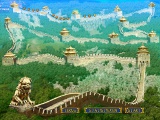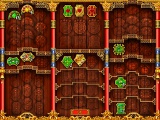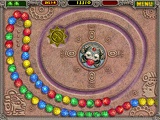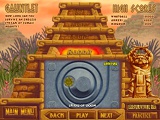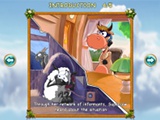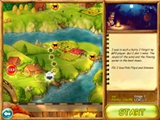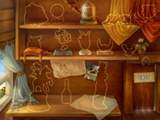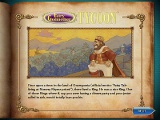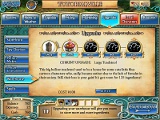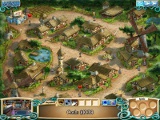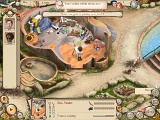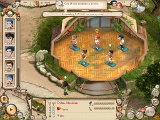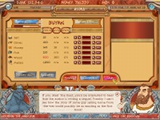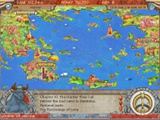





Chinese Temple
This game from City Interactive, predecessor of titles like Zuma
Deluxe, is so old it needs the CD in the drive. As this is bad for both CD
and drive, I'm still busy on a workaround with an ISO image, and played the game
just long enough to get screen captures. As can be expected, the game is
addictive. A "dragon" of coloured balls runs down a track towards a temple
mouth: it is up to the player to keep the dragon out of the temple by shooting
more balls at it, since balls of the same colour will destroy each other. As
such, this is a very fanciful arcade version of a match-3 game. The tracks that
the dragon follows become more convoluted with each level, making it harder to
hit. If the player hasn't eliminated the dragon within a certain amount of time,
the difficulty doubles as a second dragon starts to snake out. The levels are
represented by towers in the Great Wall of China, and there is a trophy room for
well-played levels.
Zuma Deluxe
Zuma Deluxe was made by Popcap Games, known for simple and addictive games.
It shows. Zuma is simpler than that other prominent marble-shooter game, Luxor 2, and has a different layout; instead of a
horizontally scrolling paddle, there is a ball-spitting frog in the middle which
can be moved around like a compass needle, and there is just one chain
(sometimes more chains) of marbles, with nothing behind it to push it, moving
through a gully spiralling around the frog. Some marbles contain special
effects, which show as glowing signs and are released when the marbles are
destroyed, so there is nothing to catch. The only instance of having to do
something other than shoot at a chain is the coin which appears in a corner and
stays for a while before disappearing; if there are no chains in the way, it can
be shot for extra points. The chain moves at what I consider a normal speed,
more slowly than in Luxor 2.
Having a South American theme, it has "tribal" music with an occasional cry
of "Zuma!" that makes all the marbles turn glassy for a second. There are two
ways to play: Adventure mode, with levels, where each "won" level cracks apart
and the frog falls through to a deeper level, and Gauntlet, where the player
picks a map and an unending string of marbles runs out until the player loses.
The three lives are represented by frogs, and at the level where an extra colour
is added, which steps up the difficulty, the player is given a warning of
imminent defeat in broken English, followed by "Ribbit".
Supercow
A demo installed by a supermarket CD, this is one of the rare side-scroller
games. I don't like sidescrollers because all that shifting from one screen to
another makes me woozy, and my reaction speed sucks. A fan of the genre would
love it. Our bovine superheroine receives a distress call from a sheep: an evil
professor has abducted the farm animals by drugging them with sugary treats.
Very witty, which is why I used up the 60-minutes demo time before thinking of
grabbing a screencap. Sadly, it was the Dutch translation, so the written text
was stilted and not as funny as the original, but the English voiceovers had
been left intact. Collecting medical kits and milk cartons was fun, and
defeating guard dogs by jumping on them, very satisfying.
The game disappeared from the site when Oberon Media became CasualGames, and
reappeared when CasualGames merged with Iplay. Before that, it was available
only at Big Fish Games. I installed the
English demo from Big Fish Games for some screencaps:
Fairy Godmother Tycoon
A gutbustingly funny parody of all fairytale classics and at least one set of
cartoon characters (check out the first two screen caps) wherein it is revealed
that the fairy godmother isn't a kind person at all: she's a ruthless
businesswoman, and those little favours are only to improve her public image!
This is what's called "strategy" or "simulation", but since these games are not
complex enough for actual simulations, I'd call it a time management game with
less rush and more focus on results. The idea is to get rich in the potion
business, both by selling potions and by catching the occasional randomly thrown
bag of money (vaguely visible right-of-centre in the third screenshot, with the
rays emanating from it), first in a quiet easy village, then in bigger locales
where you might have to eliminate the competition with mafia-esque tactics. This
one is on my "buy" list for its comedy value alone.
The game disappeared from the site when Oberon Media became CasualGames, and
reappeared when CasualGames merged with Iplay. Before that, it was available
only at Big Fish Games.
Eye for Design
As told in a comic drawn in the style of a flash animation, a white-haired
interior design student with huge glasses gets the highest marks of her class,
only to find herself without work when she graduates. It is up to the player to
land her assignments and carry them out so that her reputation will increase and
more and higher paid assignments will come rolling in. It's like the room
decorating games in Fabulous Finds, only uglier and
totally counter-intuitive. I simply couldn't understand what the game wanted
from me. So, I scrubbed it.
Wanting to reinstall the demo to capture a screenshot, I found that it was
only available at Big Fish Games, having
disappeared from the site when Oberon Media became CasualGames (it reappeared
after the merge with Iplay). I also found it was not, on second thought, quite
so hard: the secret is to find how to fit all requested pieces of furniture,
most of which can occupy more than one position, in the room together and make
their styles and colours match as far as possible. The better the furniture is
arranged and matched, the higher the customer's appreciation, expressed in
trophies of bronze, silver, gold or platinum. Once I understood how it works, I
scored one platinum trophy after another. One secret that the tutorial doesn't
tell you about is that extra points can be had by adding as much items as
possible from under the Accessories tab.
Like many vintage games, it's a tiny download, and allows just one user who,
in the starting menu, has just one choice: continue current game, or start a new
one. I advise going back to this opening menu and choosing "Continue" after
every few assignments, as this causes the game to save its progress and,
presumably, free up RAM; I seem to have a memory leak running this game under
64-bit Windows 7, and frequent saving prevents a bluescreen with continuous
droning beep that can only be closed by a hard reboot.
Artist Colony from Romantic Discoveries Bundle - 3 in 1
Like Fairy Godmother Tycoon, this is a "simulation", ie.
less stressed-out version of a time management game. I'm glad I bought the
bundle, as it laid to rest a false impression I got from the demo: that the game
is into racial stereotyping. Well, it is - it's into stereotyping, period - but
not as nastily as I thought. The backstory: two artists, one high on discipline,
the other high on talent, set up a colony especially for artists. The
disciplined artist has a wife, called Mimi, and a baby son. The talented artist
manages to seduce her with his animal attraction and, pregnant with his child,
she runs away, no longer able to face either of them. They quarrel and leave;
the colony falls into disrepair. Fast-forward a generation: Mimi's two children
are now adults. The older brother Ben (painter) and his friend Dylan (musician,
black, I had the impression that this was his half-brother from the "bad"
father) have returned to the colony and want to restore it to its former glory.
They are joined after a few days by the real half-brother, a boozy type who
unintentionally steals Ben's love interest, and the drama is about to repeat
itself, but unlike his father, Ben can count on a friend to pull him through.
The game is several screens of pretty scenery just waiting to be cleaned up,
something that will have to be done continually as flowerbeds keep going to
ruin, weeds spring up and dirt collects. As the colony becomes more attractive,
more artists will enter it to make use of its facilities. The money their
creations make is then used for more building improvements. At the same time,
the artists need maintenance too: they must be provided with food, places to
sleep and inspiring visuals. Their needs are also not as complex as the demo
made me think, the main thing is to keep them happy and inspired, assign them
maintenance tasks to keep the colony clean and fresh-looking, train them in
their artistic specializations (they can't produce the next work of art until
they've gained a skill point, although once they've reached their maximum, they
can pump out the art non-stop, inspiration and energy levels permitting) and
even raise other artists' inspiration levels by giving public performances. If
their happiness/inspiration drops too low, artists leave the colony, only to
come back as new arrivals with their skill points reset to zero. As the colony's
gallery fills up with art, buyers will come in, offering amounts sometimes way
above, sometimes way below the real price. I learned the hard way: always sell,
no matter what the offer, to free up space so the artists can keep producing.
Although Ben and Dylan are paired up with the first two artists that join them
at the colony, they and all the other artists can spontaneously crush on a
random other artist, which means they should be dragged to that artist to check
how reciprocal the feelings are and will then make an artwork based on either
the wings of love or the pain of a broken heart, which will automatically sell
for more, after which the crush, having served its purpose, expires. The
simulation is quasi-open-ended: it has a storyline with quests to fulfill, after
which I can keep playing and earning the colony more money, but with nothing to
spend it on, there's no real point, beyond the amusement of maintaining a human
ant farm of "arteeste" types in a pretty setting with - a nice touch - changing
seasons. Leading to the situation of artists still using their outside picnic
places for a nap on a thick blanket of snow.
Tradewinds Odyssey from Magic and Mystery Bundle - 3 in 1
Along the same lines as Fairy Godmother Tycoon and just as
gutbustingly funny, this one sporks the living daylights out of Greek mythology.
The player picks one of several characters - the misunderstood Minotaur, the
sister of Helen of Troy, an athlete falsely accused of substance abuse, and
others - and sails from ancient city to ancient city with an upgradable fleet,
trading ingredients (buy at low price, sell at high price), buying protective
enchantments, and carrying out whatever requests and missions come up on the
way. On the journey, there are pirates and mythological monsters to defeat. The
interlude screen when the next screen loads looks like a fresco. Although this
was rather a mismatched game bundle and one of the games in it was downright
iffy, I can recommend both the bundle and this game individually. The only
possibly objectionable aspect of the game is the sometimes wailing background
music, which may grate on the nerves after a while.
See also Tradewinds Adventure Pack.

